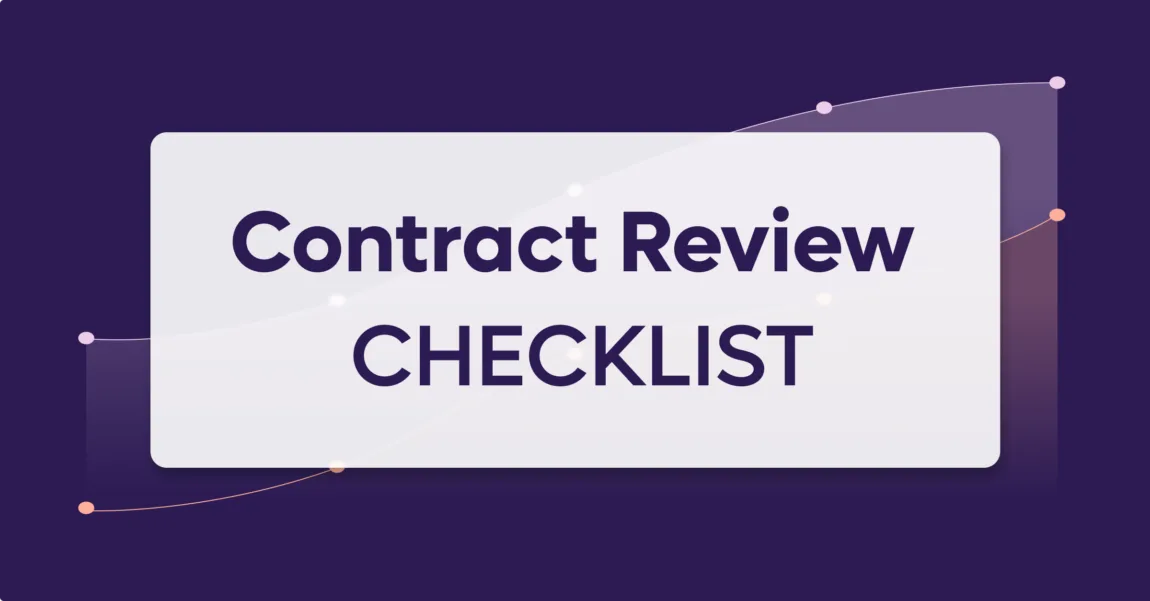Among the challenges every business faces there’s the critical task of managing contracts, particularly Master Service Agreements (MSAs). These documents, often running dozens of pages, contain the legal and business terms that define the relationship between companies and their clients or vendors.
The dense legal language, the bunch of clauses, and the potential for costly oversights make it essential to approach the task with a clear strategy. This guide is here to help. Whether you’re an executive, part of a legal team, or a business development professional, understanding how to review an MSA agreement effectively can save your company time, money, and unnecessary headaches.
We’ll walk you through the essential steps of the MSA review process, offering tips and tools—including AI tools to streamline your workflow and help you focus on what matters most, growing your business.
What the MSA review process looks like
Reviewing a Master Service Agreement (MSA) is an easier task when you break it down into manageable steps to cover all critical aspects related to your business and make the process more straightforward.
- Identify critical clauses. We’re talking about clauses that often include payment terms, termination conditions, liability limitations, intellectual property rights, and confidentiality agreements. Pay particular attention to any clauses that might seem standard but could carry hidden risks if left unchecked.
- Understand legal obligations. Get familiar with the obligations you’re agreeing to. This includes knowing what’s required of you under the contract and what you can expect from the other party. For SMEs and startups without extensive legal resources, it may be helpful to consult with a legal advisor.
- Ensure alignment with business goals. Ideally, the MSA should support your goals. Meaning, that there must be an alignment with your operational needs, finances, and long-term strategy. Imagine your goal is to maintain flexibility, you might want to negotiate favorable termination/exclusivity terms then.
- Collaborate with legal and business teams. Reviewing an MSA shouldn’t be done in isolation. Involve your legal team and business stakeholders. Legal teams provide insight into potential risks and compliance, while business teams can assess whether the terms make sense from an operational POV.
- Use a checklist to streamline the process. To make sure nothing is overlooked, consider using a contract review checklist. A checklist can help you systematically go through each section of the MSA. It’s a simple tool that can save you time and reduce the likelihood of missing important details.
Tips for reviewing an MSA
It’s time to dig deeper into the details of the MSA. The goal of this next chapter is to define a solid agreement that protects your business but aligns with your strategic business goals at the same time.
Focus on payment terms. Payment terms are one of the most critical aspects of any MSA. Terms should be clear and favorable to your business. Look for details on invoicing procedures, payment timelines, and any conditions under which payments can be delayed or disputed. If your business relies on a steady cash flow, consider negotiating terms that minimize delays and get you prompt payments.
Review termination clauses carefully. Termination clauses define how and when the agreement can be ended, and under what conditions. Pay close attention to these, as they impact your business continuity. Ideally, you want to avoid terms that allow the other party to terminate the agreement without cause on short notice. If such terms are unavoidable, try to negotiate a longer notice period or other conditions.
Assess liability limitations. Liability clauses set the boundaries for what each party is responsible for if something goes wrong. These clauses often limit the amount of liability one party can claim from the other, so it’s crucial to understand these limits and assess whether they are fair. In some cases, you may want to negotiate higher liability limits or include exceptions for specific types of damages.
Negotiate key terms to align with your goals. Every business has unique needs and goals, and your MSA should reflect that. Don’t hesitate to negotiate terms that align with your strategic objectives. Whether it’s adjusting payment schedules, modifying exclusivity clauses, or specifying the scope of services, tailor the agreement to suit your business. Both parties should benefit from the MSA terms.
Creating a master service agreement review checklist
Here’s a well-structured DIY master service agreement review process to streamline your legal work.
| Checklist item | What to check | Why it’s important |
| [ ] Scope of work | Verify that the scope of work details services and/or products, responsibilities, and timelines. | A clear scope of work prevents misunderstandings and sets clear expectations for parties. |
| [ ] Payment terms | Review invoicing procedures, payment schedules, and penalties for late payments. | Favorable payment terms help maintain financial stability and avoid any contractual dispute. |
| [ ] Confidentiality | Look for clauses that define what info is confidential, how it should be handled, and its duration. | Protects your business’s sensitive information, which is key in competitive industries. |
| [ ] Termination conditions | Examine notice periods, grounds for termination, and penalties or obligations upon termination. | Helps plan for potential scenarios/disputes where the relationship may need to end. |
| [ ] Liability and indemnification | Assess the fairness and reasonableness of liability limitations and indemnification. | These clauses significantly impact your business’s risk exposure and financial liability. |
| [ ] Dispute resolution | Method for resolving disputes (arbitration, mediation, court) and the specified location/law. | A clear dispute-resolution process can save time and money if conflicts arise. |
| [ ] Intellectual property rights | Review the provisions related to intellectual property (IP) ownership (who) and usage. | Critical for products and services heavily relying on proprietary technology or content. |
| [ ] Exclusivity/non-compete clauses | Look for clauses that limit your ability to work with others and assess alignment with goals. | Such clauses can restrict your business opportunities, so you must grasp the implications fully. |
| [ ] Amendment procedures | Confirm that there’s a process for making changes, requiring mutual agreement in writing. | Helps avoid confusion and ensures that changes are mutually agreed upon. |
| [ ] Consistency across MSAs | Compare terms across different master service agreements, looking for any deviations. | Simplifies management and reduces the risk of legal disputes by maintaining consistency. |
Master service agreement review with AI

For SMEs and startups with limited resources, the traditional manual review process can be time-consuming, prone to errors, and costly. This is where legal AI assistance comes into play, bringing a new way to speed up the MSA review process with greater accuracy, and of course, cost-effectiveness.
Tools like AI contract review software typically use natural language processing (NLP) and machine learning algorithms to analyze contracts. This technology is trained on vast amounts of legal data, enabling them to understand the nuances of contracts. When applied to an MSA, AI can parse through the text, spot key clauses, and even suggest revisions based on best practices or specific business needs.
Gartner says that large language models (LLMs) are expected to boost legal department productivity by 10% to 20% over the next 2–5 years. The report highlights that the benefits of deploying AI in law practice far outweigh the risks, making it an essential tool for modern legal teams.
A word to the wise: Incorporating AI into your MSA review process doesn’t mean replacing your legal team—it means giving them superpowers with tools that make their work more efficient and effective. In fact, AI technology allows your team to focus on high-level strategic decisions and negotiations.
You may be interested in:
How to Review an NDA?
Contract Review Cost: How Much Does It Cost?
How to Conduct a Digital Marketing Services Agreement Review
Wrapping up your MSA review process
MSAs sets the foundation of your business relationships. Navigating the complexities of these agreements can be challenging, but it becomes manageable with a strategy. If you follow a structured review, focus on key clauses, and use tools like contract review checklists and AI contract review software, you’ll make sure that your next MSA is legally sound and aligned with your business goals.
The time you invest in thoroughly reviewing and negotiating your MSA will pay off in the long run by protecting your business interests and fostering stronger, more reliable partnerships. Whether you’re just starting out or looking to refine your approach, the tools and tips outlined in this guide can help you streamline the review process, reduce risks, and ultimately, drive your business forward.







By entering your email, you agree to our Terms & Conditions and Privacy Policy.